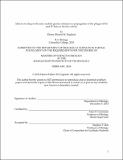Effects of cell growth and a mobile genetic element on propagation of the phages SP16 and SP-beta in Bacillus subtilis
Author(s)
England, Eleina M. (Eleina Helen Maria)
DownloadFull printable version (881.6Kb)
Other Contributors
Massachusetts Institute of Technology. Department of Biology.
Advisor
Alan D. Grossman.
Terms of use
Metadata
Show full item recordAbstract
Two studies were performed on Bacillus subtilis phages SP16 and SP-beta to characterize the effects of growth and an integrative conjugative element, ICEBs1, respectively. I found that B. subtilis strains are significantly more susceptible to SP16 infection early in the growth phase and less susceptible during exponential growth and as cells approach stationary phase. SP16 makes plaques of different sizes. I found that this variegated plaque size did not seem to breed true. That is, phage from large plaques gave rise to both large and small plaques. On the other hand, phage were difficult to recover from small plaques, indicating that the phage were either not viable or gave rise to small plaques that were barely visible. A second study analyzed growth of SP-beta and established the time required for a single round of phage growth. I verified that presence of ICEBs1 in the B. subtilis chromosome, prevented lytic production of SP-beta. I also verified that this phenotype was due to a single gene in ICEBs1.
Description
Thesis: S.M., Massachusetts Institute of Technology, Department of Biology, 2014. Cataloged from PDF version of thesis. "February 2014." Includes bibliographical references (pages 25-28).
Date issued
2014Department
Massachusetts Institute of Technology. Department of BiologyPublisher
Massachusetts Institute of Technology
Keywords
Biology.